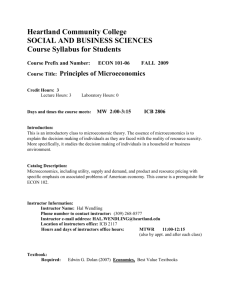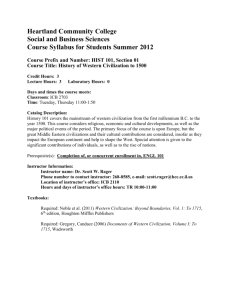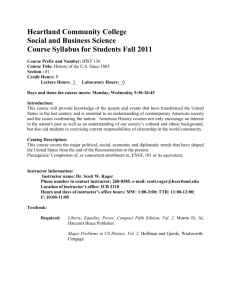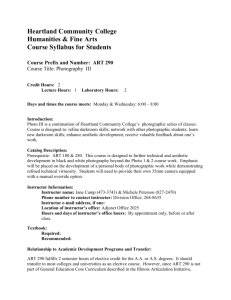HIST 136 01 Rager SP 12 - Heartland Community College
advertisement
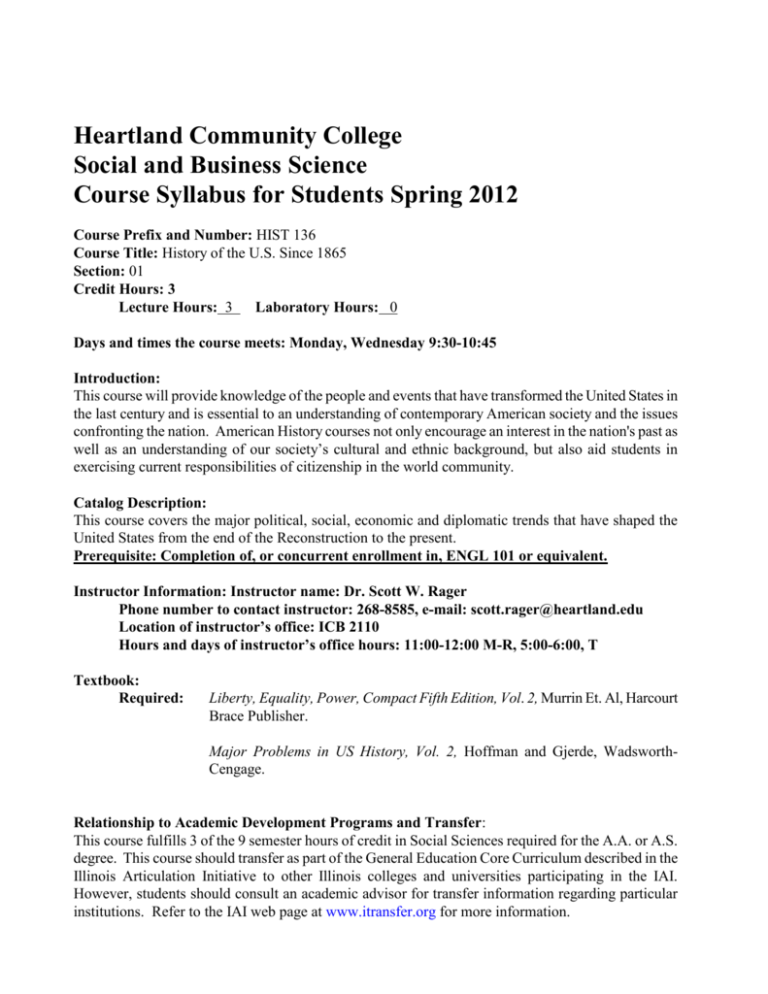
Heartland Community College Social and Business Science Course Syllabus for Students Spring 2012 Course Prefix and Number: HIST 136 Course Title: History of the U.S. Since 1865 Section: 01 Credit Hours: 3 Lecture Hours: 3 Laboratory Hours: 0 Days and times the course meets: Monday, Wednesday 9:30-10:45 Introduction: This course will provide knowledge of the people and events that have transformed the United States in the last century and is essential to an understanding of contemporary American society and the issues confronting the nation. American History courses not only encourage an interest in the nation's past as well as an understanding of our society’s cultural and ethnic background, but also aid students in exercising current responsibilities of citizenship in the world community. Catalog Description: This course covers the major political, social, economic and diplomatic trends that have shaped the United States from the end of the Reconstruction to the present. Prerequisite: Completion of, or concurrent enrollment in, ENGL 101 or equivalent. Instructor Information: Instructor name: Dr. Scott W. Rager Phone number to contact instructor: 268-8585, e-mail: scott.rager@heartland.edu Location of instructor’s office: ICB 2110 Hours and days of instructor’s office hours: 11:00-12:00 M-R, 5:00-6:00, T Textbook: Required: Liberty, Equality, Power, Compact Fifth Edition, Vol. 2, Murrin Et. Al, Harcourt Brace Publisher. Major Problems in US History, Vol. 2, Hoffman and Gjerde, WadsworthCengage. Relationship to Academic Development Programs and Transfer: This course fulfills 3 of the 9 semester hours of credit in Social Sciences required for the A.A. or A.S. degree. This course should transfer as part of the General Education Core Curriculum described in the Illinois Articulation Initiative to other Illinois colleges and universities participating in the IAI. However, students should consult an academic advisor for transfer information regarding particular institutions. Refer to the IAI web page at www.itransfer.org for more information. COURSE OBJECTIVES (Learning Outcomes): Learning Outcome GE Code Method of Assessment Distinguish between primary and secondary sources as the foundation of modern historical scholarship from 1865 to the present. PS1 exams, quizzes, research paper, group project, other methods Interpret primary sources critically by analyzing their historical contexts. CT3 exams, quizzes, research paper, group project, other methods Formulate historical interpretations, both in discussion CO4 and in writing, and defend them critically with reference to primary and secondary sources. exams, quizzes, research paper, group project, oral report, other methods Incorporate into historical interpretations, both in CT3 discussion and in writing, an understanding of historical causation reflecting a) knowledge of important figures and events and their chronological relationship to each other and b) an awareness of the contingent relationships. Acquire at one and the same time a comprehension of DI3 diverse cultures and shared humanity, as evidenced both orally and in writing. Exams, quizzes, research paper, group project, oral report, other methods exams, quizzes, research paper, group project, oral report, other methods Topic Outline for the Course: The following topics are to be covered during the instructional process: 1. 2. 3. 4. 5. 6. 7. 8. 9. 10. 11. 12. 13. 14. 15. Reconstruction Closing of the Frontier and Western Expansion Industrialization and Its Impact Gilded Age Politics, 1876-1896 Overseas Empire and Expansionism Progressive Era, 1900-1917 World War I Jazz Age: The 1920’s The Great Depression and New Deal Isolationism to Involvement: World War II Cold War and McCarthyism Eisenhower Era, Civil Rights and the 1950’s The 1960’s: Kennedy, Johnson and Vietnam Nixon through Carter Reagan through Bush: Recent Trends Course Policies: Method of Evaluation (Tests/Exams, Grading System): 1 midterm exam 100 points 1 final exam 150 points 2 quizzes, 50 points each 2 document discussion assignments, 3-5 pages, 50 points each 1 research paper topic proposal, 25 points 1 research paper status report, 2- 3 pages, 50 points 1 research paper, 8-10 pages, 100 points 625 Points total: 90% 625-562=A 80% 561-500=B 70% 499-437=C 60% 436-375=D Below 60% = F Attendance Policy Students are expected to attend all classes and participate meaningfully in the activities of each class session. Attendance will be taken at every class meeting. All students are allowed three unexcused absences. Additional absences may be excused at the discretion of the instructor with proper documentation. College sanctioned activities are excused absences. More than three unexcused absences will result in a penalty of a loss of 5% of the total possible points in the class. Note: Because starting class on time is extremely important, 10 minutes late arrival to class 3 times will count as an unexcused absence. Also, such actions as sleeping, gaming, or texting are unacceptable during class time and will count as an unexcused absence. Incompletes An incomplete may be given at the instructor’s discretion, if the student, by the withdrawal date, can reasonably be expected to pass the course. Incompletes may be granted only when justified by extreme circumstances (e.g., serious illness, accident, death or serious illness in the immediate family) See College Catalog for further information. Extra-Credit: No extra credit is anticipated for this class. Make-up of Tests and Assignments: All make-ups are granted at the discretion of the instructor and will be determined according to the individual merits of the case. Students are required to contact the instructor by mail or by phone within 24 hours after a quiz or an exam is missed to make arrangements for a make-up at the testing center. Failure to follow this policy will result in grade penalties. Deadlines: Assignments received late will be penalized. Everyone must submit a research paper by April 11. Late papers will not qualify for full credit. No student can pass the class without submitting a research paper . Required Reading and Writing: This course requires approximately 30-40 pages of reading per session or 500 per semester. A minimum of 15 pages of college level writing is required in this course. Writing assignments include an 8-10 page research paper, essays on exams and other projects as deemed appropriate by the instructor. Specifications for written materials: Written materials will be formatted exactly as they are in English classes, ie standard MLA format. Student Conduct: Inappropriate behavior in the classroom will not be tolerated by the instructor. At all times students should endeavor to conduct themselves in an honest and mature manner. Cell phones should be turned off upon entering class. Absolutely no use of cell phones is allowed, including texting, during class time. Please also note that no food or beverages with the exception of water are allowed in the classroom. HCC Portal Just a reminder that to access WebCT, IRIS, and your Heartland Student Email, you will need to log into myHeartland, at https://my.heartland.edu. Syllabi Disclaimer: Changes to the Course Calendar may be made during the course of the class. This is sometimes unavoidable and students will be notified in class should changes become necessary. Course Calendar Notice of Cancelled Class Sessions Cancelled class sessions, for all HCC classes, will be listed under Cancelled Class Meetings in the A-Z Index and under Academic Information in the Current Students page on the HCC Web site. Go to http://www.heartland.edu/classCancellations/ to learn what classes have been cancelled for that day and the upcoming week. Be sure to check the last column, which might contain a message from the instructor. Dates for class topics/reading/exams. Note: Lecture topics are in bold face type; the pages listed after each chapter are those corresponding to the lecture topic. Students are expected to read the chapters in the textbook completely. Date Topic Week 1 Jan.18 Course Introduction Week 2 Jan.23, 25 Reconstruction Chapter 17 pp. 625-658 Week 3 Jan. 30, Feb. 1 the New South and West Chapter 18 pp. 659-694 Research Proposal due Week 4 Feb. 6, 8 the Industrial Age Chapter 19 pp. 695-724 Chapter 20 pp. 735-770 Week 5 Feb. 13, 15 the Industrial Age (cont.) Week 6 Feb. 20, 22 the Farmers' Revolt Chapter 19 pp. 724-734 Research Status Reports due Student Meetings with Instructor (optional) Week 7 Feb. 27, 29 Progressivism Chapter 21 pp. 770-808 Student Meetings with Instructor (optional) Week 8 Mar.5, 7 Progressivism (cont.) Midterm Exam March 7 Week 9 Mar. 19, 21 the U.S. Becomes a World Power Chapter 22 pp.809-828 Week 10 Mar. 26, 28 Progressive Foreign Policy and WWI Chapter 22 pp. 828-838 Chapter 23 pp. 839-868 *Draft of Research Paper due to Writing Center or Tutoring Appointment must be completed no later than March 29 Week 11 Apr. 2, 4 the Post War Era and the 1920's Chapter 23 pp. 866-874 Chapter 24 pp. 875-918 Week 12 Apr. 9, 11 the 1920's (cont.) the Great Depression and the New Deal Chapter 25 pp. 919-962 *Research papers due Apr. 11 Week 13 Apr.16, 18 1920s and 30s Foreign Policy and WWII Chapter 26 pp.963-1008 Week 14 Apr. 23, 25 Cold War the Vietnam Era Chapter 27 pp.1009-1050 Chapter 28 pp.1051-1060, 1086-1096 Chapter 29 pp.1112-1124, 1129-1136, 1143-1148 Chapter 30 pp. 1176-1181 Week 15 Apr. 30, May 2 the Civil Rights Movement Chapter 27 pp. 1038-1042 Chapter 28 pp. 1076-1082, 1096-1099 Chapter 29 pp. 1103-1112, 1124-1129 Chapter 30 pp. 1192-1193 Week 16 May 7, 9 Recent Trends Chapter 28 pp. 1058-1059 Chapter 30 pp. 1178-1179, 1183-1185 Chapter 32 pp.1238-1240, 1244-1249, 1253-1254 Week 17 Final Exam Wednesday, May 16 8:00-9:50




